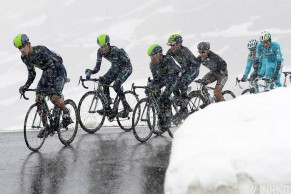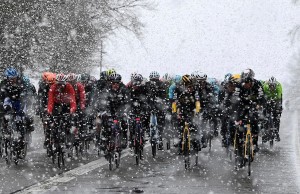Could the 2023 Giro d'Italia be cancelled?
The first of the queen stages was cut short due to weather conditions, major flooding in the Emilia Romagna region and the suspension of an event such as the Italian Formula 1 GP to be held this coming weekend at the Imola circuit, near Bologna, the heart of that region, as safety could not be guaranteed and the Giro d'Italia could not be affected by a similar measure.

All against the Giro d'Italia 2023
The Italian peninsula is affected by the most torrential rains of the last century, especially in the Emilia Romagna region in the north of the country, which, in turn, has affected the Giro d'Italia, which has been under water since its start two weeks ago on the Adriatic coast.
The terrible weather that the cyclists are suffering, to which must be added the very long stages, unusual in this times, that the Giro d'Italia had programmed in its route, have meant that illnesses have taken their toll on many of the riders, with cases of colds, bronchitis and other associated conditions that have been depleting the peloton day by day.
RECOMENDADO

Alcoholic beverages with the fewest calories

What would you do if you won the lottery? This cyclist bought himself a €20,000 bike

Tips for cycling in the rain

25 cycling gifts ideas to get it right

When do helmets have to be changed? Do they have an expiration date?

The best apps for cycling and mountain biking

Perhaps the bad weather also has something to do with the Covid-19 rebound that has occurred among the riders and that has deprived us of the great favorite for the final victory as was the Belgian Remco Evenepoel, as well as other contenders such as Aleksandr Vlasov.
To all this we must add the crashes associated with the wet road, guilty of the casualty of another of the favorites as was Tao Geoghegan. An accumulation of circumstances that have ended up triggering a clear boycott by the cyclists through their representatives of the Association of Professional Cyclists who have turned stage 13, one of the days called to decide the race, into a mere pantomime.

As of today, 135 riders remain in competition out of the 176 riders who took the start on May 6th, with some teams such as Soudal-QuickStep totally depleted as only three riders are still participating.
The fear of further withdrawals and the forecast of bad weather for the next few days have led to the conjecture that the Giro d'Italia may have to be suspended.
The never seen before
In fact, a grand tour has never been suspended once it has started, and in the past these events have had to deal with much more serious problems than they do today.
In the past, it was not uncommon for stages to be contested against all odds, although sometimes they were interrupted by strikes and protests or, in others, it was the cyclists themselves who stood up to the inhuman conditions in which they were forced to race. In fact, many of you will have heard the expression "The Forced of the Road" coined by the journalist and writer Albert Londres with his account of the 1924 Tour de France where he described the suffering and extreme conditions that the cyclists had to face.

However, despite all the incidents that have occurred, despite the suspension of a stage due to bad weather or, on some occasions, as a sign of mourning for the death of a cyclist, the show has continued. Not even genuinely black Tours de France, such as that of 1998, with the doping investigations following the Festina affair, which led to the abandonment of numerous teams in protest at the treatment meted out by the French authorities, stopped taking place.
A fear, that of suspension, that comes from a philosophy implemented in recent years and that, in certain weather conditions, seeks to preserve the cyclist's health without taking into account that if this sport has been in the collective imagination for more than a century, it is partly because of the epic that its riders had to face.

Inhuman routes ascending endless mountains, no matter if it was hot or cold, overcoming the difficulties of the road and seeking to beat the rivals. In fact, some of the most memorable days in the history of the sport took place in truly hellish conditions. It is inevitable not to remember the mythical Gavia stage in 1988, in which the cyclists even urinated on their hands to feel a little warmth in them at a time when technical clothing did not even exist.
Nowadays we live suspensions and cuts of stages with too much assiduity without taking into account the damage, especially in the image of this sport, determined continuously to put sticks in the wheels, never better said. A clear example was experienced a few months ago in O Gran Camiño, a young tour that tries to make a place for itself among the proposals for the beginning of the season and saw how the riders boycotted the competition on a day when the snow made its appearance.

Nevertheless, it is highly unlikely that this Giro d'Italia will reach a point where suspension would be necessary, although it is not out of the question, if the weather does not improve, that we will see more cuts or even the cancellation of some stages, especially due to the pressure of the cyclists combined with the enormous hardness that awaits the peloton in the coming days.